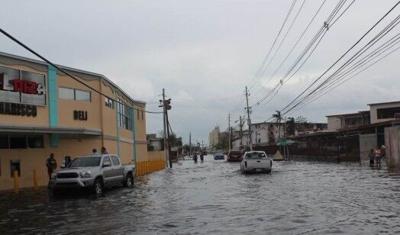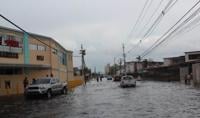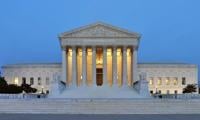
Flooding on Loiza St. in San Juan from Hurricane Maria in 2017
SAN JUAN, Puerto Rico – Another federal judge in Puerto Rico has refused to blame oil companies for a devastating hurricane season in 2017, tossing claims that said climate change led to Hurricane Maria.
Judge Aida M. Delgado-Colon on Wednesday joined a colleague who ruled the same in September. It’s a win for large companies like Exxon, Chevron and Shell, who were sued in 2023 by the municipality of San Juan in 2023 by a private lawyer it hired, David Efron.
The earlier dismissal came in a similar racketeering lawsuit brought by 37 municipalities in Puerto Rico that had hired the firms Milberg Coleman and Smouse & Mason. That ruling said they had waited too long to sue.
Given that Delgado-Colon called San Juan’s a “copycat lawsuit,” it follows that it was also tossed.
“The Court sees no reason why it should depart from the thoughtful statute of limitations analysis performed by its sister court in the Municipalities’ case,” Judge Delgado-Colon wrote.
San Juan filed a racketeering complaint claiming Big Oil’s actions caused the climate change that created Hurricane Maria, which killed nearly 3,000 Puerto Ricans in 2017. RICO claims are subject to a four-year statute of limitations.
Lawyers in both cases tried to tie various corporate stances on climate change to a pattern of racketeering, then said the statute of limitations was tolled because the defendants concealed information from the public.
“The federal court in Puerto Rico correctly dismissed San Juan’s climate lawsuit as time-barred, because the underlying issues have been publicly known for many years,” said Theodore Boutrous Jr. of Gibson, Dunn and Crutcher, counsel for Chevron.
Climate change cases stateside have not sought damages for past events like hurricanes but instead seek payment for the costs of upgrading infrastructure. Dozens of states, cities and counties have sued but their theory – also brought by private lawyers who scored government contracts – has been met with skepticism by judges.
Seven judges have said the cases do not deal with state-law claims like consumer deception and public nuisance and instead effectively seek to disrupt federally established emissions standards.
Judges in South Carolina, Maryland, New Jersey, New York, Delaware and Pennsylvania have said this is better left to the federal government, and President Donald Trump has issued an executive order banning any new cases.
In Colorado and Hawaii, the state supreme courts allowed cases to move past the defendants’ motions to dismiss. Suncor Energy and Exxon have petitioned the U.S. Supreme Court to take a look at the Colorado ruling, though SCOTUS previously refused to review Hawaii’s.
Twenty-six states, in an amicus brief led by Alabama Attorney General Steve Marshall, last month urged the Supreme Court to take up the case.
“Suits like this one imperil the ability of Amici States to achieve their policy prerogatives on energy production and environmental protection,” the brief says.
“To be sure, States can assign liability for conduct outside their borders in some contexts. But the theory that every State can regulate every molecule that enters the atmosphere anywhere in the world is unlimited.”








